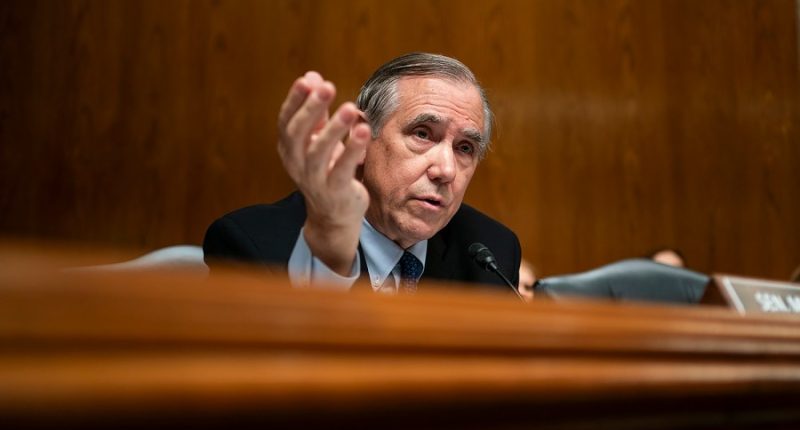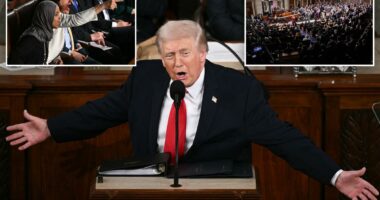Share this @internewscast.com

The CBO anticipates that the tax component of President Trump’s highly-promoted legislation would increase deficits beyond 2034, which is outside the 10-year budget frame, potentially breaching the Senate’s Byrd Rule.
In a letter addressed to Sen. Jeff Merkley (D-Ore.), the top Democrat on the Senate Budget Committee, CBO Director Phillip Swagel clarified that the congressional budget office “forecasts that title VII,” the section of the bill overseen by the Finance Committee, “would lead to deficit increases in the years following 2034.”
Democrats asked the CBO to score the budgetary impact of making the 2017 expiring Trump tax cuts permanent by using a current-law baseline.
According to existing law, the Trump tax reductions are set to lapse at the conclusion of this year, meaning any prolongation of these tax measures would be considered as exacerbating the deficit after 2034.
Democrats will argue that this is a violation of the Senate’s Byrd Rule, which determines what legislation is eligible to pass the Senate with a simple-majority vote on the reconciliation fast track.
The Byrd Rule requires that legislation considered as a reconciliation package not increase the deficit for a fiscal year beyond the “budget window” covered by the measure.
The budget window for the One Big Beautiful Bill Act spans from 2025 to 2034.
Merkley’s staff said the Republican bill is out of compliance with the rules of reconciliation by exceeding the spending limits outlined in their budget resolution by trillions of dollars and adding to the deficit beyond the 10-year window.
Swagel, who was appointed to his post during Trump’s first term, told Merkley that the tax portion of the bill would increase the deficit by nearly $3.5 trillion from 2025 to 2034.
Merkley could attempt to raise 60-vote point of order against the bill on the floor in an effort to block the legislation.
But Senate Majority Leader John Thune (R-S.D.) and Senate Budget Committee Chair Lindsey Graham (R-S.C.) feel confident that the tax portion of the bill complies with the Byrd Rule.
Thune says Graham has authority under Section 312 of the Congressional Budget Act “to determine baseline numbers for spending and revenue.”
Graham has judged the extension of the 2017 expiring Trump tax cuts as a continuation of “current policy” and therefore as not adding to the deficit.
Republicans say they have offset the cost of language to make expired corporate tax cuts permanent by finding more than $1.6 trillion in spending cuts, including an estimated $930 billion in cuts to Medicaid.
Graham received a letter from Swagel on Saturday estimating that the Finance portion of the “big, beautiful bill” complies with the reconciliation instructions for the 10-year budget window and does not add to the deficit after 2034.
Swagel informed Graham that when using the current-policy baseline favored by Republicans, the Finance Committee’s text would increase deficits by not more than $1.5 trillion over the 2025-2034 period.
“In addition, CBO projects that the legislation and each individual title would not increase on-budget deficits after 2034,” he wrote.
Republican staff on the Senate Budget Committee have pointed to a publication on the congressional budget process issued by then-Budget Committee Chair Bernie Sanders (I-Vt.), who caucuses with Democrats, stating that the Budget chair “makes the call on questions of numbers.”
That Democratic publication asserted that the Budget Committee chair has the job of advising the Senate’s presiding officer to decide what estimates of the CBO and Joint Committee on Taxation should be used to decide procedural questions on the floor.
The bill narrowly advanced in the Senate late Saturday night, teeing it up for an expected final vote on Monday.

















